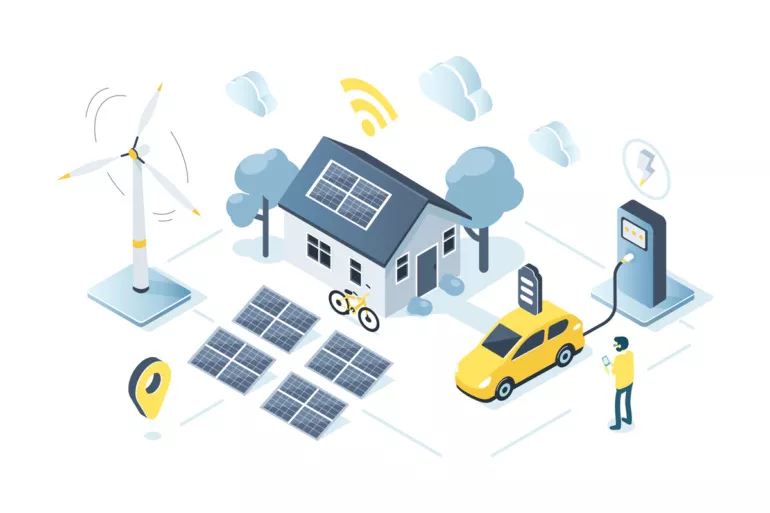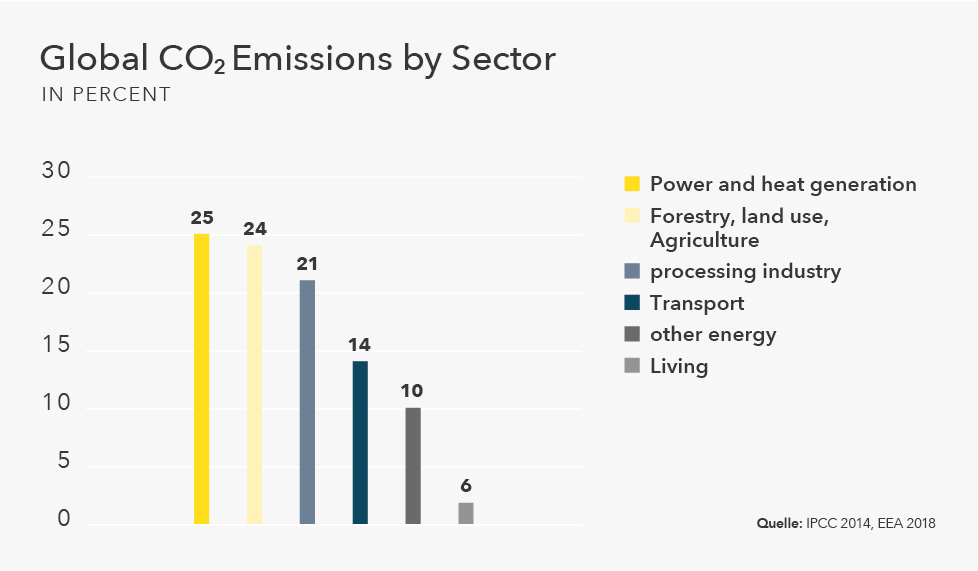News & Trends
Decarbonization of the Economy

Can we Succeed?
1.5 °C! This limit value has been reverberating through society and the global economy as an urgent appeal for five years now. The United Nations’ Paris Climate Convention is the authoritative guide to limiting climate change.
The European Green Deal takes responsibility and sets the target of net zero by 2050. CO2 emissions are to be reduced to zero in order not to exceed the all-important 1.5 °C limit that has been set.
Global Warning — Keeping a Cool Head in Order to Get to Net Zero
Over the past 150 years concentrations of CO2 have increased by about 45 percent. Every year, we emit billions of tons of CO2 into the atmosphere. Changes in small steps to existing processes and systems will no longer be enough in future — we have to radically change the path of carbon emissions. The switches must be set using transformative technologies that sustainably reduce CO2 emissions and pave the way to a carbon dioxide-free global economy.
4 Things That Need To Change
Among the main emitters of greenhouse gases the energy industry, transport, the manufacturing industry and agriculture take ‘pride of place’. Any 1.5 °C scenario will require major economic changes in these sectors.
Foodure — Hunger for Vegetable Meat
house gas emissions, which are primarily caused by methane, come from agriculture. Our diet will change. According to a study by the thinktank RethinkX, we will eat almost no animal meat anymore by 2035. The consumption of beef alone is forecast to fall by 90 percent. Plant-based Meat is only one of many alternatives, and it consists completely of vegetable ingredients and is similar to animal meat products. Wheat, yellow peas and Coconuts have come to the fore as ingredients due to their meat-like taste profile.
Transformative Technology
A new era in the use of hydrogen as clean energy? The Hyundai Motor Company recently delivered the first range of fuel cell commercial vehicles to Swiss customers. Heavy traffic only emitting water vapour — Coop, Migros and several other Companies want to get involved and have already placed advance orders. A further 1,600 XCIENT Fuel Cell Trucks are expected to be delivered by 2025. Hyundai is responding to the increasing demand for environmentally friendly transport solutions and has announced that it is expanding into North America and China in addition to Europe. The South Korean automobile manufacturer supports the growing hydrogen ecosystem and is striving for a nationwide network of filling stations in Switzerland. The declared goal is the further development of fuel cell technology. Energy for a clean and sustainable form of mobility.

Hello, climate-neutral transport — goodbye, CO2 emissions!
Green Cement
40 percent of carbon emissions are attributable to the industrial sector as a whole. A better integration of the circular economy, the optimization of processes and an increase in efficiency would enable a large cross-section of industry to reduce its CO2 emissions by one third by 2050. The world market leader LafargeHolcim is now also mixing construction waste into its “cement of the future”, which is why using “Susteno” in concrete production already produces 10 % less CO2.
Carbon Management
CO2 directly from the ambient air filter? The Start-up Climeworks based in Zurich has invented a kind of vacuum cleaner invented the CO2 from the atmosphere pulls. collectors filter the carbon dioxide and remove the greenhouse gase from the air — Direct-Air-Capture-Technology (DAC). This technology uses about 400 times less space than the planting of trees and other plants would do. Coca-Cola already buys the separated carbon dioxide and uses it to produce beverages. The price per “captured” tonne of CO2 is expected to be around 100 Swiss francs by 2030. The construction of a CO2 storage facility is currently being planned, which will store the captured CO2 underground and thus produce negative emissions.
When Outsiders Overtake Insiders
True innovation is usually not related to a particular industry. For example, traditional car manufacturers increase in the efficiency of combustion engines for decades. But it was newcomer Tesla who rewrote the chapter on mobility. Investors must add Futuremover stocks to their portfolios at an early stage, because the innovations they incorporate rewrite the rules of the energy industry (renewable instead of fossil), mobility (shared instead of owned), agriculture (smart instead of mass) and industrial manufacturing (additive instead of subtractive).



